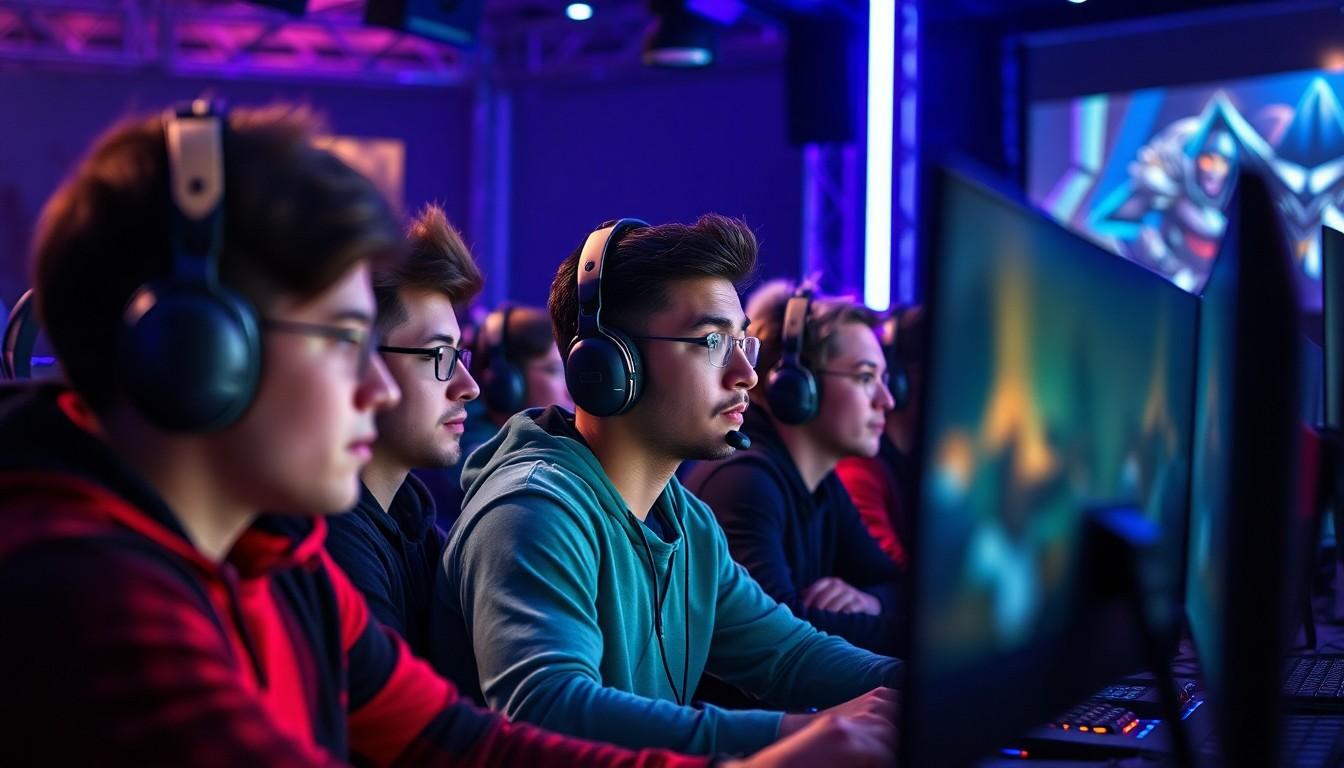In the fast-paced world of gaming, strategy esports games stand out like a well-placed checkmate in a chess match. These games aren’t just about reflexes; they require cunning, foresight, and a dash of creativity. Players dive into intricate worlds where every decision counts, making it a thrilling blend of mental gymnastics and adrenaline.
Strategy Esports Games
Strategy esports games stand out because they require a blend of tactical thinking and quick decision-making. These games often involve intense competition, where players plan and execute their tactics in real-time. Popular titles within this genre include
StarCraft II,
Dota 2, and
League of Legends.
Players in these games typically assume unique roles, contributing to team success through specific actions. Team coordination plays a critical role, with each member depending on the others for victory. Success often hinges on understanding map control, resource management, and opponent prediction.
The competitive scene for strategy esports has grown considerably, drawing large audiences and significant sponsorships. Tournaments frequently offer substantial prize pools, encouraging high-level gameplay. For instance, the
The International for
Dota 2 features multi-million dollar prizes, showcasing the game’s popularity.
Community engagement reflects the impact of these games. Players often participate in forums and streams, contributing to discussions and sharing strategies. Online platforms like Twitch further amplify this engagement, allowing fans to witness expert gameplay and learn from the pros.
With advancements in technology, strategy esports games continue to evolve. Developers introduce regular updates and expansions, enhancing gameplay and maintaining player interest. The interplay of strategic depth and competitive spirit forges a captivating experience, appealing to both casual and hardcore gamers alike.
Popular Strategy Esports Games
Strategy esports games capture diverse audiences with their unique gameplay and competitive nature. These games challenge players to think critically and adapt quickly, making them thrilling to watch and play. Here are some of the most popular titles in the genre.
Game 1: Description and Highlights
StarCraft II stands out within the strategy gaming community. This real-time strategy game requires players to manage resources, build bases, and command units to defeat opponents. Rich in competitive history, it features diverse factions, each with distinct abilities. Players often engage in intense matches that demand quick thinking and practice. StarCraft II boasts a robust esports scene, showcasing tournaments like the World Championship Series with significant prize pools. Its depth and complexity continue to attract both amateur and professional players.
Game 2: Description and Highlights
Dota 2 captivates fans with its deep strategic elements and teamwork requirements. This multiplayer online battle arena game features two teams battling to destroy the opposing Ancient structure. Unique heroes bring varied skills and abilities, creating diverse gameplay experiences. The international tournament, known as The International, draws massive audiences and offers multi-million dollar prize pools, highlighting Dota 2’s prominence. Pro players consistently refine their strategies, fostering a vibrant community invested in mastering the game’s intricacies.
Game 3: Description and Highlights
League of Legends ranks as one of the most popular esports games worldwide. This team-based strategy game pits two teams against each other, focusing on character selection and synergy. Players navigate a richly designed map, engaging in intense battles while managing resources and objectives. With regular updates and character releases, Adam constantly evolves, keeping the gameplay fresh. Major events like the League of Legends World Championship showcase top teams competing for impressive rewards, further solidifying its position in the esports landscape.
Competitive Scene of Strategy Esports
The competitive scene in strategy esports showcases thrilling gameplay and immense talent. Tournaments and events drive significant engagement from teams and players.
Major Tournaments and Events
Dota 2’s International stands out due to its multi-million dollar prize pools. StarCraft II features the World Championship Series, bringing top players together for intense matches. League of Legends hosts the World Championship, highlighting the strongest teams globally. Events like the ESL Pro League and DreamHack Masters offer additional competitive opportunities, further amplifying the excitement. Each of these tournaments attracts extensive viewership, with fan engagement reaching millions on platforms like Twitch and YouTube.
Notable Teams and Players
Teams like Team Liquid and Evil Geniuses have established themselves as leaders in the strategy esports arena. Individual players such as Johan “N0tail” Sundstein and Lee “INnoVation” Shin-hyung are celebrated for their exceptional skills and achievements. Their consistent performances in major tournaments serve as inspiration for upcoming players. Organizations like Fnatic and T1 also contribute to the vibrant competitive landscape, showcasing talent and acquiring sponsorship deals. The collaborative efforts of teams and players create dynamic narratives that captivate audiences and elevate the esports experience.
Key Strategies for Success in Strategy Esports Games
Success in strategy esports games hinges on a combination of solid understanding, effective communication, and well-executed tactics. Players must master these essential elements to excel in competitive environments.
Understanding Game Mechanics
Grasping game mechanics stands at the core of success. Knowledge of unit abilities, map layouts, and resource management leads to informed decision-making. Each title offers unique mechanics; for instance, StarCraft II emphasizes resource gathering and unit positioning, while Dota 2 focuses on hero abilities and synergy. Familiarity with these elements enhances strategic planning. Players who can quickly adapt to in-game mechanics often outperform opponents. Exploring tutorials and patch notes keeps players updated on changes, enabling efficient gameplay adjustments.
Effective Team Communication
Team communication elevates gameplay dynamics significantly. Clear and concise communication fosters coordination among players, allowing for synchronized strategies. Using voice chat and quick commands helps convey vital information during matches. Players should share essential details, such as enemy positions and cooldown timings, to optimize team performance. Establishing pre-game strategies and in-game signals minimizes confusion and maximizes efficiency. Teams that effectively collaborate tend to dominate, as they can respond rapidly to opponents’ movements and changes on the battlefield. Developing a strong communication network enhances strategic execution and solidifies team synergy.
Future Trends in Strategy Esports Games
Emerging technologies will shape the future of strategy esports games. Virtual reality (VR) and augmented reality (AR) offer immersive experiences, enhancing player engagement. Innovations in gameplay mechanics, such as artificial intelligence (AI) opponents, may provide new challenges and dynamic environments. Additionally, cross-platform capabilities will allow players on different systems to compete, broadening the player base and enhancing community interactions.
Esports organizations will increasingly invest in youth development programs. Talented players can now access training resources that focus on strategy and teamwork. Sponsorship deals are likely to expand further, attracting more brands to the esports landscape. Prize pools are projected to increase, with major tournaments potentially exceeding ten million dollars in payouts.
Sustainability practices are becoming essential in event management. Promoting eco-friendly tournaments could appeal to environmentally conscious gamers and sponsors. Innovations in broadcasting will also enhance viewer experiences, with real-time analytics and interactive features allowing fans to engage more deeply with the action.
Social media platforms will play a crucial role in promoting strategy esports. Streaming services like Twitch will integrate enhanced features to facilitate better fan interaction. Communities will grow stronger as players and fans share insights on platforms that encourage strategy discussions. Further content creation will expand engagement, with influencers driving viewership and participation.
Diversity in game narratives will likely attract broader audiences. Representation in character design, storylines, and team compositions encourages inclusivity among players and fans. Finally, as strategy esports games evolve, collaboration with educational institutions may foster interest in STEM fields. The integration of gaming with education could result in a new generation of players equipped with critical thinking and problem-solving skills.
The strategy esports genre continues to thrive and evolve, captivating players and audiences alike. Its blend of tactical depth and team coordination fosters a unique competitive environment that challenges even the most skilled gamers. As technology advances and new trends emerge, the landscape of strategy esports will only become more dynamic and engaging.
With growing investment in youth development and sustainability practices, the future looks promising for both players and fans. The potential for increased prize pools and enhanced viewer experiences through innovative broadcasting will further solidify the genre’s place in the gaming industry. As strategy esports games continue to attract diverse audiences, their impact on gaming culture is undeniable.


